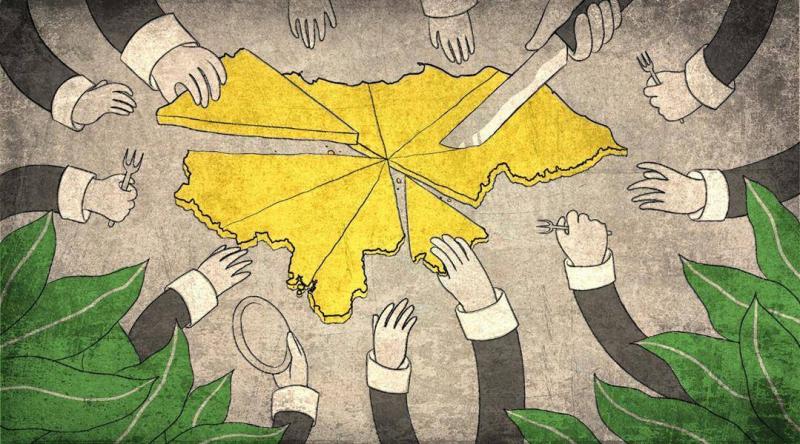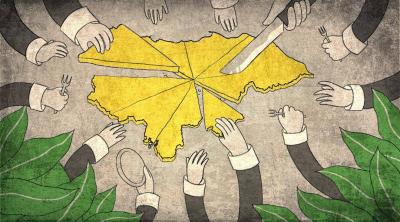Following Israeli Prime Minister Benjamin Netanyahu's condemnation of the Democratic Senate Majority Leader's call for new elections in Israel, describing it as "completely out of place," Netanyahu stated in an interview with CNN regarding this proposal: "We are not a banana republic." So, what do we know about the banana republic?
The term "banana republic" is a sarcastic label used to belittle or disparage a politically unstable country that lacks political and economic weight among nations, with an economy reliant on a limited number of products, such as banana cultivation, and is governed by a small, wealthy, and corrupt elite. This term is often used in a derogatory manner to describe certain governments in Central America and the Caribbean, but it has also extended to refer to countries in South America, Asia, and Africa, according to Wikipedia.
#### Origin of the Term
The term was originally coined by American writer O. Henry to refer to the fictional Republic of Anchuria in "Cabbages and Kings" (1904), a collection of short stories set in Central America. It was used to describe dictatorial governments that allowed the establishment of vast agricultural plantations on their lands in exchange for financial returns. The modern use of the term has come to describe any unstable or dictatorial regime, especially when elections are rigged or corrupt, and where the leader serves foreign interests.
In the 19th century, American writer O. Henry (William Sydney Porter, 1862-1910) created the term "banana republic" to describe the fictional Republic of Anchuria in "Cabbages and Kings" (1904), stemming from his experiences in Honduras, where he spent six months hiding in a hotel in Trujillo while wanted in the United States for embezzlement.
In the early 20th century, the United Fruit Company, a U.S. multinational corporation, contributed to the creation of the "banana republic" phenomenon. Alongside other American companies like the Cuyamel Fruit Company, and sometimes with support from the U.S. government, these companies created the political, economic, and social conditions leading to banana republics in Central American countries like Honduras and Guatemala.
#### Historical Background
The history of banana republics began with the introduction of bananas to the United States in 1870 by Lorenzo Dow Baker, a telegraph cable captain who bought bananas in Jamaica and sold them in Boston at a 1000% profit. Bananas became popular among Americans as a cost-effective tropical fruit compared to local fruits like apples. By 1913, one could buy a dozen bananas for 25 cents (equivalent to $6.34 in 2018), compared to just two apples.
In 1873, to provide food for U.S. railroad workers, American railroad magnates Henry Meiggs and his nephew Minor C. Keith established banana plantations along their newly built railroads in Costa Rica. Recognizing the profitability of banana export, they began shipping the fruit to the southeastern United States.
By the late 19th century, three American multinational companies (United Fruit Company, Standard Fruit Company, and Cuyamel Fruit Company) dominated the banana industry, controlling the infrastructure of roads, railways, and ports in Honduras. The Honduran government ceded 500 hectares to banana companies along the extracted railroad line, despite there being no railway service to the capital, Tegucigalpa. Among the Honduran people, the United Fruit Company was known as "the octopus" due to its extensive control over Honduran society, transportation infrastructure, and its sometimes violent manipulation of national politics against labor.
By the 1930s, the United Fruit Company owned 3.5 million acres of land in Central America and the Caribbean, becoming the largest landholder in Guatemala. These holdings gave it tremendous power over the governments of small countries, confirming the appropriateness of the term "banana republic."
#### Modern Interpretations
Occasionally, countries that gained independence from colonial powers in the 20th and 21st centuries tend to exhibit traits of banana republics due to the impact of large private corporations in their politics. For example, the Maldives (resort companies), Chile (foreign mining companies), and the Philippines (tobacco industry, U.S. government, and its corporations).
On May 14, 1986, then-Australian Treasurer Paul Keating suggested that Australia could become a banana republic. This statement received much commentary and criticism, and it was seen as a turning point in Australia's political and economic history.




